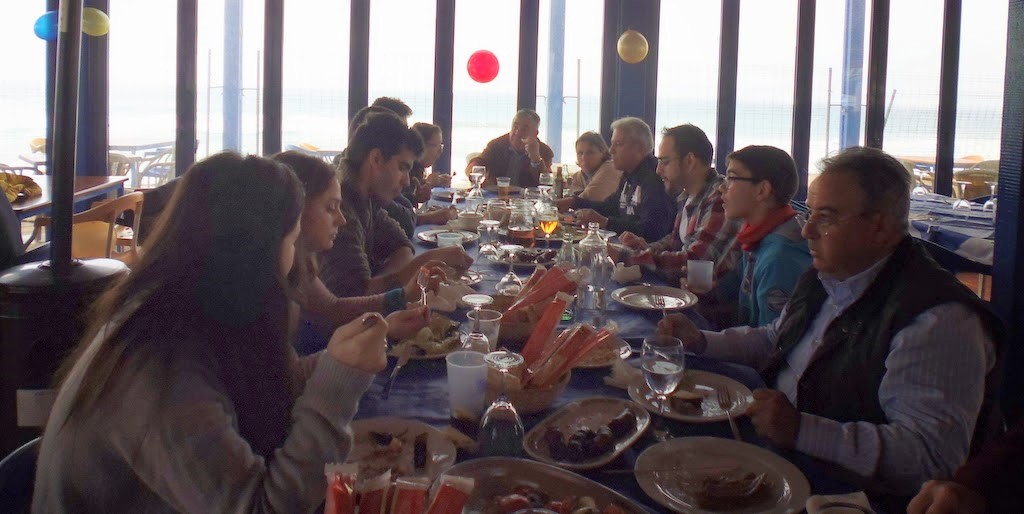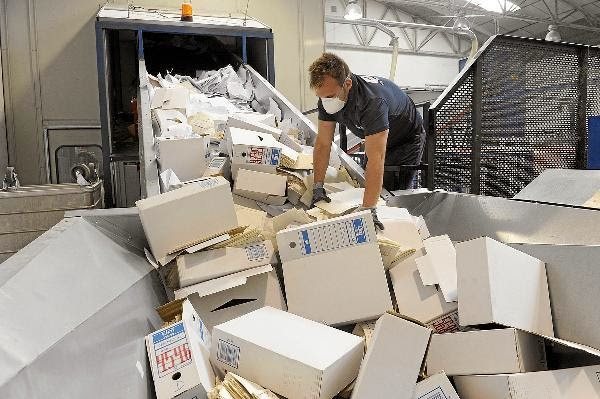Learning English
Tuesday, March 28, 2023
A local woman in the shop across from where I live put me down from the beginning as an Englishman. She's right, although I could be German or Swedish - as so many of us are. Anyway, English.
And to prove her point, she bursts out with her entire knowledge of the language in one remarkable salute when I heave up alongside.
Wotcher, she says.
I wonder where she picked up that particular greeting. Probably from a holiday visit to Torremolinos some time in the distant past. Or maybe she went to see a show at a music hall in the Old Kent Road.
Wotcher, orl the naybours cried,
ooh yer gonna meet Bill,
as yer walks the street Bill...
For those who need it, including perhaps my friend from over the way, there are a number of English-language schools in Almería ideal for brushing up one's idiom, including one with the odd name of 'The Mancunian Academy', which presumably teaches its students to speak the King's English with a flat Manchester twang.
A friend who hails from that city laughed when I told him about the school and said ... the poor things will all end up speaking Espancunian. Indeed!
A student I know in the Almería educational system is sixteen and he and his 120 classmates are currently using a book called 'The Skin I'm In' by a black American author called Sharon Flake. It's written in the vernacular: '...Then I had to fess up and tell her I forgot to do it. She asked Mr Pajolli if it's OK for me to use my office time to do my math homework. He said, yeah, but that I'd have to make up the time later. Teachers don't do nothing but cause you grief, I swear that's all they do.'
There used to be a Scotsman living in the nearby resort of Roquetas and who taught English. Can you imagine the sounds his more attentive students made? Another teacher I know comes from somewhere 'oop north'. I asked him precisely where a couple of times, but frankly, I couldn't understand what he said.
Over on the other side of the pond, as a Spanish journalist reporting on the USA tells us, more and more people over there are learning to speak Spanish.
Which, as I know from experience, they most certainly aren't.
First of all, it's not Spanish. As anyone can tell you, it's called 'Mexican' (Sorry amigos!) and secondly, no one wants to speak it much beyond 'andalay' which the American girls think means 'beat it'. Indeed they insist that all the Latins learn to speak English (or to be more precise, 'American'). The claim from the Spanish journalist is frankly about as likely as the British all suddenly deciding to learn to speak Urdu.
Back to teaching the Spanish to be able to communicate with us, so that they'll understand us when we want a full-English breakfast, just try and keep it simple.
Don't ask for kippers and remember that if they don't understand you, then shout!
My advice to the Spanish students is to watch movies on the TV in the original language, not dubbed into Spanish. There's a handy button on the remote. Read stuff in English - although maybe pass on Sharon Flake for the time being - stick to Agatha Christie, and even, I don't know, brave the Brit pub down on the Costa and ask for a pint.
But above all, try and shoot for good English. After all, if you are going to make the superhuman effort to learn a foreign language, you might as well get it right. A Spanish woman I once knew spoke fluent English which she had learned while living in the East-end of London. She came from a 'good family' too.
So here's the deal: Learn English from someone who speaks or writes it clearly, because the point is to be able to communicate to those English-speakers you will be meeting later on. Not all of them will speak it very well, so why not make it easy for them.
Are you wimme?
 3
Like
Published at 12:49 PM Comments (2)
3
Like
Published at 12:49 PM Comments (2)
Good Food, Good Meat. Why Wait? Let's Eat!
Monday, March 20, 2023
I had two lunches yesterday. The first was an invitation to visit and eat with an Elderly British couple. We had fried turkey breast and a glass of white wine. Followed by an ice-cream on a stick. We talked about the weather (it's been a mixture of sunny and wet days this week).
I then made my excuses and drove along the beach to a restaurant which is opening soon for the season. It was a Spanish friend's birthday and an enormous table for thirty or more had been laid. People came and went as more and more platters arrived from the kitchen. I was sat next to two local people I knew slightly, with a Danish couple seated opposite.
I discovered that the Danes had recently bought a house in the pueblo. I was going to trnslate something for them but discovered that they both spoke fluent Spanish. 'Oh, we learned it when we decided to move here', they said.
How very un-British of them, I thought.
My neighbour passed me endless pieces of meat, sausage, morcilla, alioli and salad. The man on my other side was more concerned about my glass. I had at least three drinks in front of me at one point (although, looking at the picture now, I seem to have been the only one). Pedro was running around telling everyone to eat and drink more, as his sister looked on approvingly. A cousin invited me to go hang-gliding over Easter and a young woman asked me about journalism, as she was studying both this and the English language, and was soon to leave for Malta.
The Spanish, of course, know how to eat and enjoy themselves.
I skipped dinner, by the way.
There's a thread on Facebook with British residents discussing local Mojácar restaurants, which is the best of them and so on. Very positive. There must be a hundred places, with local and foreign cuisine: Spanish, Basque, Madrileño, French, Brazilian, German, Greek, Mexican, Chinese, Thai, Indian, American, Italian, English, Irish and Argentinian.
The choices for best place, though, and seen through British eyes, seem odd. The cheapest and worst are mentioned regularly with enormous enthusiasm, while some will only eat in those family-owned place with ridiculously large menus. Menus where one has to take out one's specs ('glafas' as a bilingual friend calls them) and read with a glass of wine to hand.
Me, uh, I'll have what he's having.
Eating out should be a leisurely mixture of good food, good wine, good company and good service. You are paying for some entertainment and some theatre.
Skimp on these and - if it wasn't for the washing up - you might as well have stayed home.
 4
Like
Published at 10:21 AM Comments (1)
4
Like
Published at 10:21 AM Comments (1)
Under Plastic
Monday, March 13, 2023
I live in an area surrounded by greenhouses.
Plastic ones.
In Almería, and perhaps only counting those invernaderos which cover the dry earth from El Ejido and Dalías east towards Almería City and La Cañada, there are said to be 36,000 hectares of crops growing under plastic. There are more west towards Adra, with the provincial frontier with a small bit of coastal Granada, and on the northern side of Almería; more still around the curiously-named town of Campohermoso (plastic farms are most certainly not hermosos - that's to say: beautiful) located in the campo de Níjar and, back on the coast, as close as they can manage to install them around the attractive natural park of the Cabo de Gata.
An article in the Spanish press calls Almería 'the Orchard of Europe'. It may be thinking more of the olive trees out towards Tabernas and Sorbas, or maybe the lemon tree I've got planted in my garden (you can see it from the street), but our main contribution to the supermarkets of Europe (and even those of the UK when Almería isn't heavily snowed in - at least according to the Daily Express), are the plastic farms, where we grow tomatoes, peppers, cucumbers and melons (and, er, marijuana too).
The number of hectares under plastic in the province hasn't changed in twenty years, which seems unlikely, since new ones are always going up, but there you go.
 |
| View from somewhere above El Ejido taken last week |
The plastic farms are raised on land which is pretty infertile: blasted by the sun and bone-dry. Back in 1960 (lots of photos here), someone figured out that covering the plot with plastic and bringing in the water - generally from underground aquifers, would encourage the plants to grow faster and stronger. It gets very hot inside the invernaderos, and frankly a bit hard to breathe on the days that one sprays with weed-killer or pesticide, but the profits are good, and the workers don't seem to have anything much to say about the conditions.
This is because most of them are either 'undocumented' or registered as migrant workers. Many live in wretched conditions (El Walili, a long-term bidonville in Nijar, was abruptly torched and bulldozed flat recently. It had some 500 residents who were obliged to scatter). Around 98% of the workers in these farms are foreigners says the local union, a number somewhere between forty and fifty thousand, and of course they don't have many rights, and certainly not The Vote (needless to say, the racist Vox party does well in the agricultural sector). A further 30,000 (generally Spanish or at least European), work in the packaging plants or as truckers hauling the produce north.
An article in Público runs details about the labour inspections in the invernaderos and the difficulties of the inspectors in finding who, where and what. According to this, in the last five years, some 11,000 workers have been found to be improperly employed, and the inspectors have handed down around fourteen million euros in fines. Agrodiario on the other hand says that the field-workers are all legal and well paid.
The plastic eventually perishes, and is either lovingly collected and sent to a proper recycling plant, or more likely, discarded in one way or another. An article on Google claims that around 80% of all used plastic ends up either as landfill or simply junked, and another 12% is burned (often in 'accidental' fires). An article at Wiki claims that around 30,000 tons of plastic waste is produced annually. On the bright side, a study by the University of Almería claims that the giant immensity of the plastic actually reduces global warmth - at least locally - by reflecting the sun's heat back into space.
One of the smaller support industries belongs to the bee-breeders. They produce small hives of a few dozen bumble-bees which are then installed within the plastic farms and employed to fertilize the plants. I sometimes find a stray one coming to inspect my lemon tree (they sting like the very devil).
Almería was always a poor and forgotten part of Spain. Now, with its gigantic industry of plastic farms, producing in 2022 a massive 2,787 million euros in sales, it's certainly odd that Vícar and Níjar are the two poorest municipalities in the entire country.
 6
Like
Published at 1:24 PM Comments (1)
6
Like
Published at 1:24 PM Comments (1)
Paperwork
Monday, March 6, 2023
We have all laughed, or shuddered anyway, at the mention of Spanish paperwork. What happens is that a veritable legion of functionaries (now, there's a word) spend their entire adult lives - it's a protected job in Spain - filling out forms.
The forms will be in triplicate, need additional supporting documents (which, in turn, will need other bits of paper) and so on.
We used to have to drive into The City, now and again, to hand in, collect, or refile various formularios for sundry purposes. I remember that one would often need a poliza, a twenty-five peseta stamp, to add to the document. These useful and decorative items would be sold in an estanco, a cigarette shop. The nearest one to the Government office invariably being half a mile away. A bit like - and maybe you have noticed - the nearest pharmacy to the hospital or medical centre is invariably located on the other side of town.
Anyway, walking calms the soul (or maybe the sole: I shall have to look it up).
My father-in-law used to be pleased if he got one or more of his three bits of paper stamped or archived as appropriate on his rare trips to Officialdom. He claimed that it brought an interesting sense of drama to his otherwise quiet existence.
We often used - and indeed we still do - the services of a gestoría, an office whose single purpose is to help you get through the various jumps which an immense army of bureaucrats must create to justify their existence. For a modest sum, the gestor will sort you out splendidly - and may, if he has other business to take care of, even accompany you to see the pen-pusher in question.
They all know each other, naturally enough - 'Hola Paco, I've got another one here, he says he wants to import a fire engine'. 'You'll need to fill out this form, and that one and bring along those two from industria, and a P834 from the police. How's your uncle doing, has he had his gall-bladder removed yet?'
You can see why you need a gestor. Buy him a drink afterwards.
Getting a residencia in the old and dark days of the Late Sixties would often revolve around a small gratuity to the nice policeman at the jefatura. I remember being deeply impressed as our gestor swept around the cop's desk and deposited a plastic bag containing a carton of Marlboro and a bottle of Johnny Walker next to the officer's lower extremities.
Everything went smoothly after that.
But, as legions of people pass in front of the armies of bureaucrats, the paperwork begins to mount up. Not just the shelves and the cupboards but the tables and chairs and even the floor are eventually full of piled up documents, and archives, and cardboard folders crammed with photocopies, and binders with abandoned forms and memos, and packets with double-spaced applications and folios in triplicate, bristling with staples and paper clips and Post-its and perhaps even some sealing wax...
and as Sarah Cynthia Sylvia Stout eventually discovered...
The garbage rolled on down the hall,
It raised the roof, it broke the wall...
When such a moment arrives, the chief pen-pusher will call upstairs to the junior political appointee, impatient to be noticed and moved to higher office, perhaps in the motor division, and inform him of the problem. Maybe fill out a few forms just for the appearence of the thing.
It is now that we meet a new department, the Junta de Expurgo. Their job is haul all the paperwork away, under supervision from a magistrate since it could be sensitive - this is when they might find that empty carton of Marlboro for instance - and to go through it in search of those treasures which must be saved for future researchers as patrimonio histórico. The rest of it is then destroyed in a special oven along with those inflamable things confiscated by the cops such as - well, perhaps it's better not to ask.
And then, the whole wonderful process begins anew.
 4
Like
Published at 7:43 PM Comments (2)
4
Like
Published at 7:43 PM Comments (2)
Gentlemen
Wednesday, March 1, 2023
While Spain has made leaps and bounds in almost every sphere, public lavatories still need some way to go. We may no longer be in the field of the early travel guide which recommended in the brief section under 'Conveniences' to 'where possible, best start your own', but there are still a few problems that need ironing out.
Being a fastidious and modern country, ruled by all sorts of obscure interests - often of a commercial leaning - we must now expect wheelchair-accessible toilets, even if the building in question has a stairway to get to it. Perhaps, you see, you broke your leg after you gained the bar.
Probably tripped over the step.
Some lavvies don't have a seat, for a reason which I shall shortly be examining, and customers, certain customers, may no doubt be obliged to fastidiously hover over the pan. Which is hard on the thigh muscles. At least these thrones will flush in an orderly way as a rule.
Many years ago, my mother pulled the chain of a local dunny and the whole tank fell off the wall and on to her head. The rest of us standing around the bar were left speechless as she returned, drenched, from the servicio. I believe I learned several words I hadn't come across until then.
Worse still, there are those latrines that don't rinse, and haven't for some time. The lever has disappeared, or maybe it rusted. You probably won't find them in your local bar, but if you find yourself caught short in the wrong neighbourhood, you'll see that, O Lordy, they exist.
One horrid sort of privy is the old-fashioned squatter, which is a kind of perforated porcelain base with two raised bits for your feet, pointing either one way or indeed the other according to the nature of one's purpose.
On the bright side, the days of being invited to put the used paper in a handy nearby basket have more or less passed.
Pissoirs, those elegant against the wall systems, are odd. They are often fixed to the wall in an elevated position, too high for the shorter gentleman. Oddly, in the USA, this tendency is reversed, with the urinal apparently installed for those of a smaller stature. Our local hotel favours these plumbing fixtures in a basement setting, which is fine, only the automatic light tends to go out after a brief time, which can be annoying if one is day-dreaming.
New Spanish bogs have lower and close-to-the-porcelain tanks, so a collapsing reservoir rarely happens anymore, even if the flow in the modern variant is somewhat reduced. They have a small and large flush to save water. Which may explain why customers sometimes feel that their brief visit to the WC is rather second-hand.
Indeed, I once stayed in a very smart hotel in Melilla and, on removing the wrapper on the crapper and lifting the lid, found a large turd in the bowl.
They had a chocolate on the pillow, too.
Talking of low tanks, many modern privies have a pan so close to the flusher than the seat won't stay vertical for the discerning gentlemen. It's hard and unnatural to try and hold the seat up while taking a whizz, so the usual thing is to not bother, and merely piss all over the commode, seat included. Using one foot to hold it up doesn't work either unless you have a good sense of balance and, besides, are seriously well-endowed.
'Yes, I've finished, go ahead' you mutter to the next person as you make your escape.
Maybe as many as a quarter of all public johns have this unfortunate design-flaw, at least around where I live.
One small step better, other thrones have a seat which appears to be steady when lifted to the vertical, but will suddenly fall from the position with a mighty crash. If that doesn't make you jerk mid-stream, nothing will.
It's all because the tank is to close to the khazi, for goodness sake. I can't imagine who designs these things, the potty company or the installers.
It's as if the Nation's fontaneros all sit down to pee - or maybe they have a secret code of humour...
But Hush!, the Secretary has just informed the President of the Worshipful Guild of Plumbers that he may rise at his convenience and deliver his speech to the congegration. Apart for his tendency to tell fart jokes, one can be sure how he will begin:
'Ladies and Gents...'
 4
Like
Published at 11:13 PM Comments (1)
4
Like
Published at 11:13 PM Comments (1)
Spam post or Abuse? Please let us know
|
|